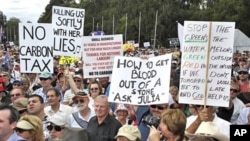Protests have taken place across Australia against plans by the Labor government to implement a carbon tax. Critics say, without a binding global agreement, the proposed levy will cost jobs and damage the economy. Hundreds of people have attended demonstrations in the national capital, Canberra, as well as in Melbourne, Brisbane, Adelaide and Perth.
Protesters say they are just ordinary Australian workers and taxpayers who feel betrayed by the government’s plans to put a price on carbon. They insist it would damage the economy and drive up the cost of living by making energy far more expensive.
"There is a ground swell of people that have finally had a gut-full," says a protester.
Another one says, "Since the Labor government has come into this country, the union rules. We just cannot do it anymore. We have no more money left to pay the taxes."
However, supporters of the tax believe it would encourage the development of a low-carbon economy and cut pollution in Australia, which is one of the world’s worst per capita emitters of greenhouses gases. In theory, polluting industries would be encouraged to reform because lower emissions would lead to a smaller tax liability.
Although precise details are still to be worked out, the government would use the receipts to compensate businesses and households for higher energy bills, as well as funding renewable energy projects to create employment.
The protesters have the support of the conservative opposition leader, Tony Abbott.
He has led a vociferous campaign against the government’s carbon tax plans.
Abbott says that, without a global carbon pricing agreement, Australian businesses would be less competitive.
"A one-sided carbon tax, a unilateral carbon tax is an act of economic self-harm," he said.
Prime Minister Julia Gillard says that opposition to the plan will not derail it.
"Now, I understand there is always going to be a variety of views in the community. We’ll see that on display today, but pricing carbon is the right thing for our nation’s future and that is why I am determined to do it," she said.
The prime minister hopes to bring in a tax on carbon next year, before introducing an emissions-trading scheme as early as 2015. She insists that, without these key economic reforms, Australia will be left behind by its international competitors.
However, Australia’s economy relies on cheap supplies of coal that generate more than 80 percent of the nation’s electricity. The country’s challenge is to harness abundant sources of renewable energy, including solar, wind and geothermal, cheaply and effectively.
Many scientists have warned Australia is particularly vulnerable to the effects of climate change and warn the vast island could suffer more severe droughts, storms and floods as a result. Other Australians, including many farmers and some conservative politicians, believe that man-made pollution is having a negligible effect on the climate and the see shifts in temperatures as part of a natural cycle.
Protesters Challenge Australian Government's Carbon Tax Plan




